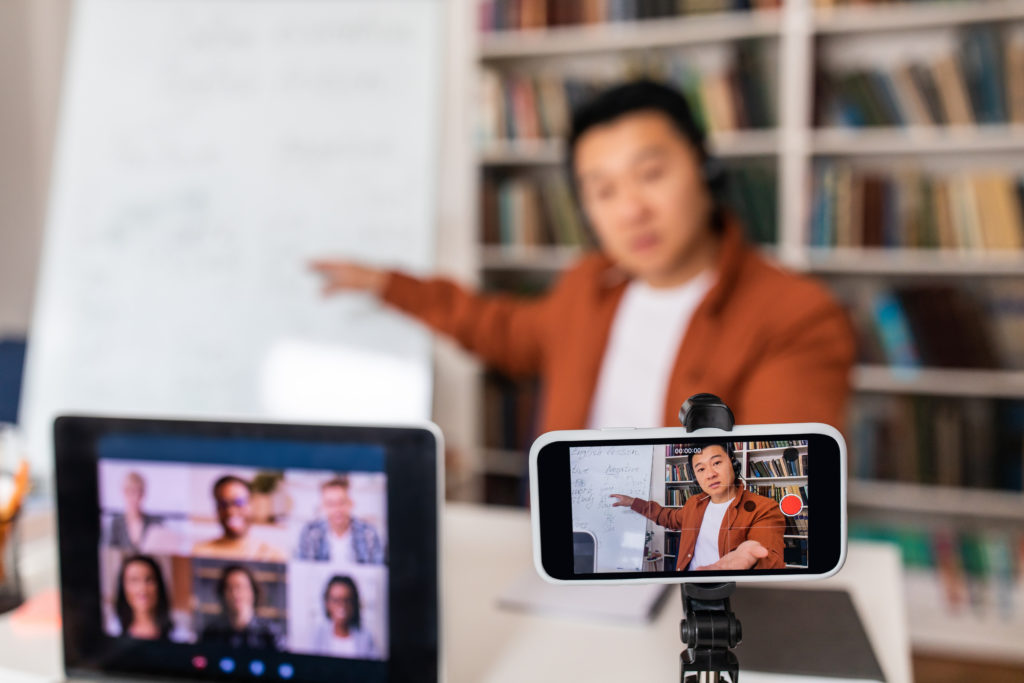Quick Hits
Daily brief research updates from the cognitive sciences

Not so long ago all learning went online – out of necessity.
There has been plenty pf research into differences in online learning and in-person learning but this study by Gellisch et al. at Ruhr-University Bochum looked at different physiological stress responses between online learning and in-person learning.
This study was interesting because it studied the same 82 students in an in-person and online learning scenario. They were attending a blended learning anatomy course that had different groups alternating between online lessons and in-person lessons (the same lessons).
The participants were monitored with heart rate sensors and also cortisol, the stress hormones, was measured by taking saliva samples at the start of the session after 60 minutes and at the end of the two-hour lesson.
What did they find?
They found that the in-person lesson stimulated higher cortisol levels, higher heart rate and lower heart rate variability. This is consistent with a stress response. So, is in-person learning more stressful? Yes, but and this is a big but, this also shows higher stimulation and higher stimulation is generally associated with better memory function and learning,
So, in short online learning is less stressful, more comfortable, but likely less impactful. This not to mention other positive benefits of in-person learning such as bonding with classmates and additional learning opportunities through casual and focused conversations around the course.
What’s more those in the in-person groups reported higher enjoyment of the very same class. So, let’s not write off in-person courses, yet!

Andy Habermacher
Andy is author of leading brains Review, Neuroleadership, and multiple other books. He has been intensively involved in writing and research into neuroleadership and is considered one of Europe’s leading experts. He is also a well-known public speaker, speaking on the brain and human behaviour.
Andy is also a masters athlete (middle distance running) and competes regularly at international competitions (and holds a few national records in his age category).
Reference
Sizhen Su, Le Shi, Yongbo Zheng, Yankun Sun, Xiaolin Huang, Anyi Zhang, Jianyu Que, Xinyu Sun, Jie Shi, Yanping Bao, Jiahui Deng, Lin Lu.
Leisure Activities and the Risk of Dementia: A Systematic Review and Meta-Analysis.
Neurology, 2022; 10.1212/WNL.0000000000200929
DOI: 10.1212/WNL.0000000000200929
More Quick Hits
Behaviour at eight helps predict midlife health behaviours
A long-term study in Finland has tracked children from the age of eight until the age of 50 and a new analysis of the data, just published, has looked at some of the correlations between socioemotional behaviour in childhood and later life achievement and health...
Psychedelics and consciousness
Psychedelics change our conscious experience of the world – that is part of their attraction. Now a new study out of John Hopkins Medicine has analysed data on attributions of consciousness to other animals and innate objects by those using psychedelics and how this...
Lower smartphone usage increases wellbeing
So much has been said about smartphone usage in modern times. This ranges from some who say that they are destroying our brain to others who see they benefit our cognition by outsourcing cognitive heavy tasks like remembering lists of phone numbers – thereby freeing...
Modesty preferred for cooperative teams
In an age where it appears that many people are vying for self-esteem especially through social media, this research is interesting. Particularly in business contexts where cooperation is king. Research has previously shown that appearing to be wealthy increases...
Poverty shrinks babies’ brains
Quick HitsDaily brief research updates from the cognitive sciences couple of studies have just been released which look at the brains of newborns and young babies. The results are worrying for any society. Brain scans of newborn babies from...
Babies born with five from seven functional brain networks
In the 1950s the blank slate theory was the most prominent theory ascribed to babies. They are born blank slates and then their experiences allow them to develop their networks thoughts, associations, etc., and just about everything else. Though this theory is long...






